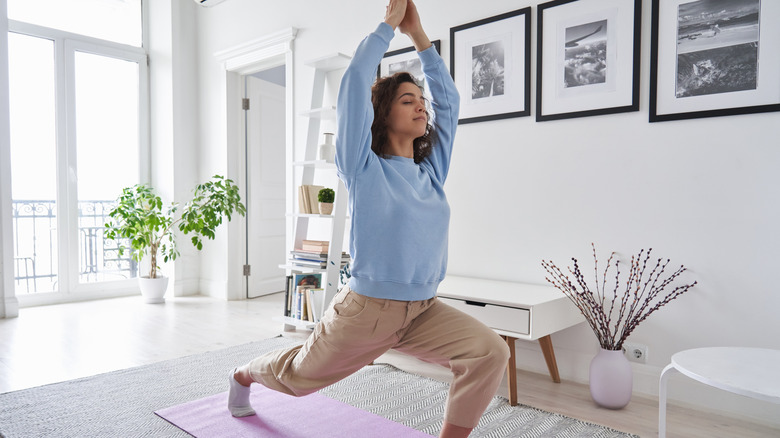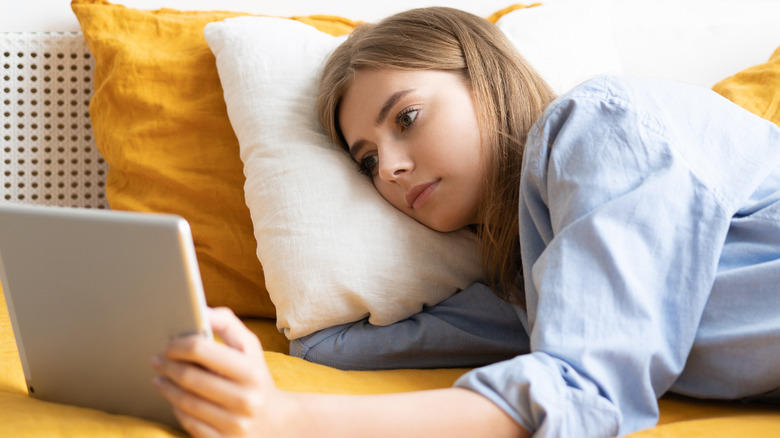How To Stave Off WFH Exhaustion (Sunlight Is Key)
While the COVID-19 pandemic changed our lives in numerous ways, perhaps nothing affected daily life more broadly than the push for work-from-home (WFH) remote positions. WFH gave us flexibility in our work wardrobe, more time with our pets, and freedom in our schedules which 91% of people say they enjoy — duh. Despite more and more companies forcing employees back into the office, people are now seeking out remote work. In fact, a 2023 survey found that 98% of respondents would like to work remotely for the rest of their careers, while another survey found that 87% of current employees said they would take a remote opportunity if they were offered.
While most of us can agree that the flexibility and freedom of a WFH position are awesome, there are also some downsides to be wary of. The massive changes to our routine that occur as a result of remote work can wreak havoc on our bodies and lead to increased exhaustion. From insomnia (hello blue light exposure), to a lack of exercise, to increased working hours, WFH can be challenging to navigate. Women and femme people in particular are more likely to experience burnout than cis men, which makes it even more important to create a remote environment that serves you. Here are some ways to stave off WFH fatigue and get the most from your remote lifestyle.
Get your vitamin D
The sunshine vitamin, aka vitamin D, is more than just something printed on milk labels. A lack of Vitamin D can lead to fatigue, muscle weakness, bone loss, depression, and can even affect fertility. That being said, 42% of adults in the U.S. have a vitamin D deficiency, making it more common than you think. A big reason for this is that there are very few foods that are natural sources of vitamin D (the most common options are foods that have been fortified with vitamin D like milk, bread, or cereal).
Sunshine is an easy way to add more vitamin D to your life, as your skin produces it through sun exposure. Oftentimes, remote work can lead to a lack of outside time, so prioritizing walks and trips outside during your WFH hours is vital in helping you up your vitamin D levels. You can also add oily fish like salmon, mackerel, or sardines to your lunches to get some extra vitamin D through your diet. While vitamin D deficiency can absolutely be contributing to your exhaustion levels, it can also have a more serious effect on your immune system. Most agree that it's almost impossible to get the daily recommended 1,500–2,000 international units (IU) of vitamin D through diet and sunshine alone, so adding over-the-counter supplements might be an effective solution. Talk to your doctor about the best options for you.
Take your breaks
One in three remote workers reported that the biggest struggle they deal with is that they stay home too often (mostly because they don't feel like they have a reason to leave). Not only is it good to step away from your screen for your mental health, but it's also a great way to add some extra activity to your day. Adding a short exercise routine to your breaks can be a great way to not only get out of the house, but also boost your energy levels. Kathryn Pinkham, founder of The Insomnia Clinic, told InStyle, "The less active we are, the less energy we have."
Whether it's taking a walk (gotta get that sunshine), or incorporating short fitness sets (TikTok and Youtube can be easy ways to find these), physically moving your body can help you combat the sedentary nature of remote work. Getting outside can also help your body's natural circadian rhythm stay on schedule, which will help ensure your sleep at night is truly restful. Dr. Lindsay Browning, a chartered psychologist at Trouble Sleeping, told InStyle that our circadian rhythm, "is usually regulated by daily cues such as exposure to daylight, when we eat our meals, and when we exercise. When we stay indoors for a long period of time, we lose many of these cues." Taking your breaks, and keeping your break schedule regular can have a huge impact on your WFH exhaustion.
Set boundaries
Remote workers are more likely to experience eroding work boundaries, with 81% of remote workers reporting that they check their email outside of work hours. With your office and home sharing a physical space, it can be extremely difficult to separate the two. In fact, 44% of remote employees reported that they actually worked more in their remote job than in previous years as in-office employees. This can contribute to the inability to disconnect from work which can affect your sleep and energy. Plus, the anxiety caused by feeling like you should check your work email or channels can lead to higher rates of burnout. Try disabling work notifications during your weekends, muting mentions in your channels, and logging out of email on your phone so you can't be tempted to merge me-time with work.
Another thing to consider is that setting boundaries is not just for carving out home hours. Setting up boundaries during your workday can leave you feeling more productive which can, in turn, lead to fewer anxiety-driven email checks during off hours. During the course of a single workday, the average employee can expect to receive 96 push notifications. These can pull your attention away from tasks, disrupt your attention, and lead to less productive workdays. Try strategies like blocking off your work calendar during certain hours, muting notifications, using digital 'do not disturb' options in channels and apps, and communicating with your team that you need quiet hours.
Track your screentime
Since 2020, an employee's average screen time has increased by an average of three hours per day (from 8.1 to 11.1 hours). This heavy screen time can further contribute to difficulties disengaging from work, as well as further mess up your circadian rhythm. Blue light glasses and skincare aren't a fad for nothing, since short wavelengths (which our brain perceives as blue light) are the strongest synchronizers for our body's circadian rhythm. This rhythm then keeps the rest of our bodily rhythms synchronized which helps our sleep, mood, and cognitive performance. Prolonged and late-night screen time can confuse your brain's natural rhythm and lead to your exhaustion the next day.
The good news is that there are a lot of ways to help you get control of your screen time. For starters, there are plenty of apps that exist to help you track your screen time, and some apps (like Instagram) even have their own in-app tracking so you can see just how many hours you spend scrolling. The key to successfully cutting down on your screen time is finding realistic ways to put space between you and your phone because going cold turkey probably isn't very realistic. Setting a reasonable goal to limit your screen time in the evenings and weekends can be extremely helpful when it comes to combating WFH exhaustion. WFH can be an awesome and flexible work structure, so remember to take care of yourself so you can enjoy all of the freedom it brings.




